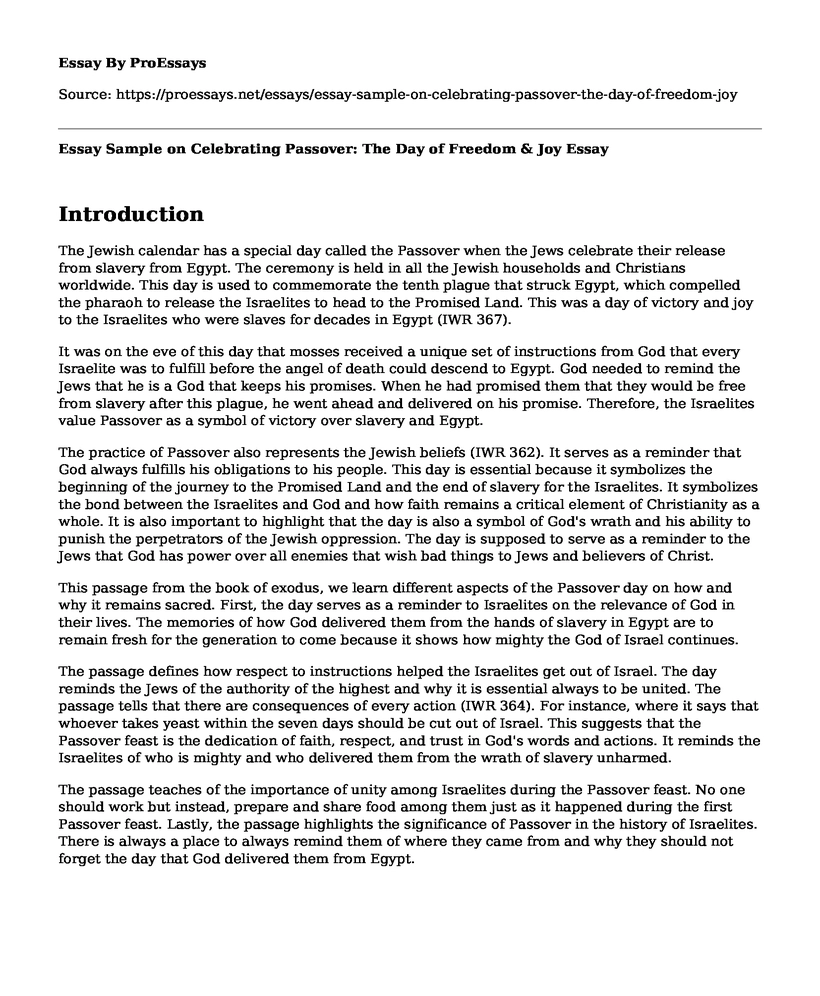Introduction
The Jewish calendar has a special day called the Passover when the Jews celebrate their release from slavery from Egypt. The ceremony is held in all the Jewish households and Christians worldwide. This day is used to commemorate the tenth plague that struck Egypt, which compelled the pharaoh to release the Israelites to head to the Promised Land. This was a day of victory and joy to the Israelites who were slaves for decades in Egypt (IWR 367).
It was on the eve of this day that mosses received a unique set of instructions from God that every Israelite was to fulfill before the angel of death could descend to Egypt. God needed to remind the Jews that he is a God that keeps his promises. When he had promised them that they would be free from slavery after this plague, he went ahead and delivered on his promise. Therefore, the Israelites value Passover as a symbol of victory over slavery and Egypt.
The practice of Passover also represents the Jewish beliefs (IWR 362). It serves as a reminder that God always fulfills his obligations to his people. This day is essential because it symbolizes the beginning of the journey to the Promised Land and the end of slavery for the Israelites. It symbolizes the bond between the Israelites and God and how faith remains a critical element of Christianity as a whole. It is also important to highlight that the day is also a symbol of God's wrath and his ability to punish the perpetrators of the Jewish oppression. The day is supposed to serve as a reminder to the Jews that God has power over all enemies that wish bad things to Jews and believers of Christ.
This passage from the book of exodus, we learn different aspects of the Passover day on how and why it remains sacred. First, the day serves as a reminder to Israelites on the relevance of God in their lives. The memories of how God delivered them from the hands of slavery in Egypt are to remain fresh for the generation to come because it shows how mighty the God of Israel continues.
The passage defines how respect to instructions helped the Israelites get out of Israel. The day reminds the Jews of the authority of the highest and why it is essential always to be united. The passage tells that there are consequences of every action (IWR 364). For instance, where it says that whoever takes yeast within the seven days should be cut out of Israel. This suggests that the Passover feast is the dedication of faith, respect, and trust in God's words and actions. It reminds the Israelites of who is mighty and who delivered them from the wrath of slavery unharmed.
The passage teaches of the importance of unity among Israelites during the Passover feast. No one should work but instead, prepare and share food among them just as it happened during the first Passover feast. Lastly, the passage highlights the significance of Passover in the history of Israelites. There is always a place to always remind them of where they came from and why they should not forget the day that God delivered them from Egypt.
Work Cited
Brodd J. Invitation To World Religions. 3rd ed. New York: Oxford University Press; 2013.
Cite this page
Essay Sample on Celebrating Passover: The Day of Freedom & Joy. (2023, Mar 12). Retrieved from https://proessays.net/essays/essay-sample-on-celebrating-passover-the-day-of-freedom-joy
If you are the original author of this essay and no longer wish to have it published on the ProEssays website, please click below to request its removal:
- LA's Free Concert for Peace Essay
- Cross-Cultural Realities at Work Paper Example
- Maryland Dialogues on Diversity Critical Analysis Paper
- Essay on Unconditional Love Beyond Blood Ties: A Story of My Life
- Essay Sample on Ain't I a Diva?: Exploring Beyonce's Phenomenon & Cultural Impact
- Essay Sample on Preserving Cultural Identity: The Vital Role of Cultural Maintenance
- Family Engagement: Enhancing Children's Learning, Development & Wellness - Essay Sample







